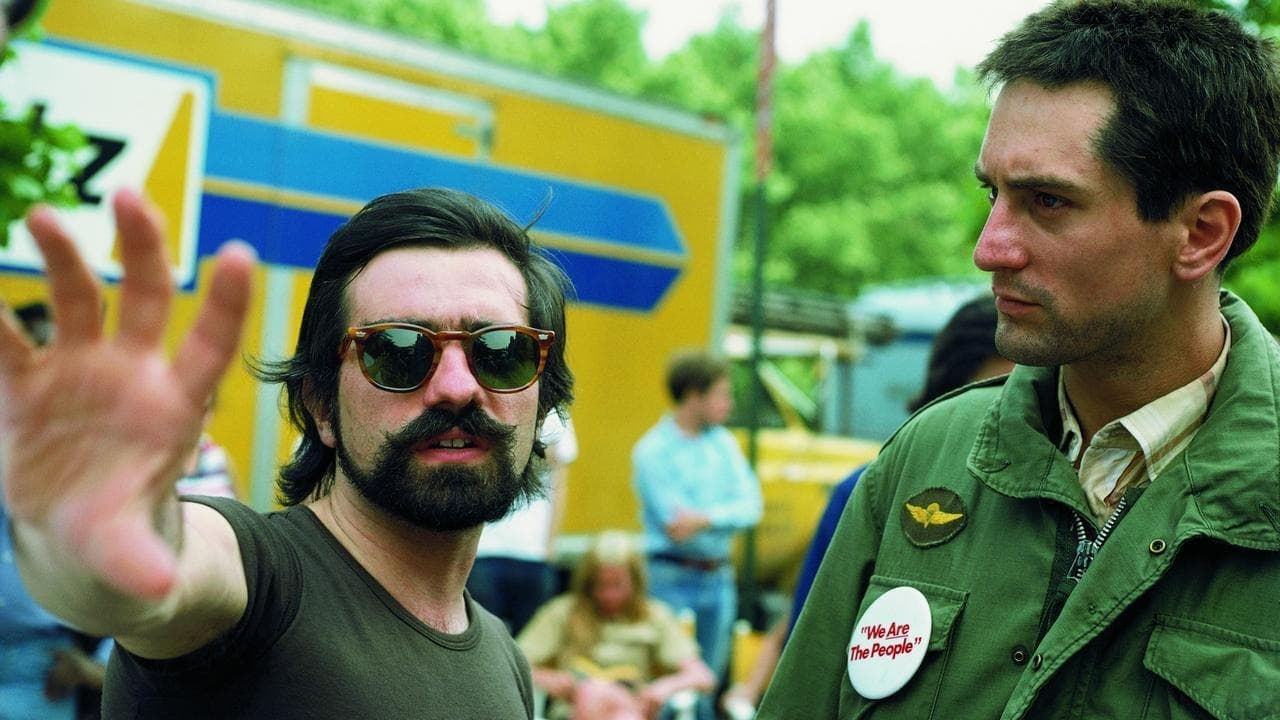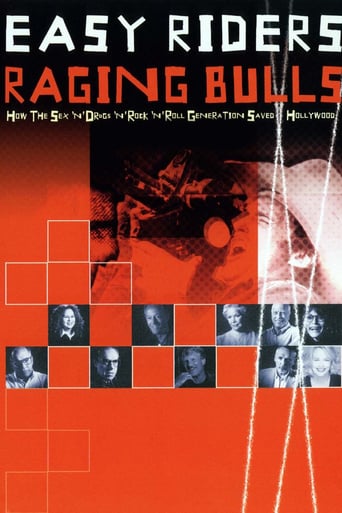

Awesome Movie
... View MoreI like movies that are aware of what they are selling... without [any] greater aspirations than to make people laugh and that's it.
... View MoreIt’s not bad or unwatchable but despite the amplitude of the spectacle, the end result is underwhelming.
... View MoreA terrific literary drama and character piece that shows how the process of creating art can be seen differently by those doing it and those looking at it from the outside.
... View MoreThe book 'Easy Riders, Raging Bulls' by Peter Biskind is a highly entertaining and informative account of the period between the late 60's and the early 80's when the big American film studios released a series of quirky, challenging and controversial films made by an assortment of auteurs. This era has since become known as the time of the New Hollywood. It was a glorious epoch for motion picture art; a time when directs such as Francis Ford Coppola, Martin Scorsese, Sam Peckinpah and Roman Polanski – amongst many others – were producing an unprecedented body of personal films. The book details the emergence of the movement from key early films such as Bonnie and Clyde and Easy Rider to the fall of New Hollywood by way of the emergence of the blockbuster movie typified by Jaws and Star Wars and epic failures like Heaven's Gate. It's a book highly recommended to anyone with a love for American movies from this period.This documentary is an attempt to capture this story, to detail some of the key films and interview a few of the film-makers involved. Of course it can never cover the scope of the book. Nevertheless it remains a useful guide to the films, and it does cover the basic key points that Biskind made about the trajectory of New Hollywood and why it happened in the first place and why it ultimately died. It suffers a little from the people it doesn't speak to such as Scorsese, Coppola, Friedkin and Polanski. And it could maybe have done with more actual clips from these films. But any documentary that covers this golden era of film-making has something going for it straight away. Therefore it comes recommended to IMDb users. Also worth noting is that the DVD contains over an hour and a half of extra material that is just as fascinating and should definitely be viewed. For another view on this subject – and for my money an even better documentary – try A Decade Under the Influence, also released in 2003.
... View MoreAfter 20th Century-Fox's "The Sound of Music" raked in big box-office and Academy Awards, every Hollywood studio was busy for the next couple of years trying to duplicate its success (it isn't specified here, but Fox itself was one of the hungriest at pilfering from this genre). Unfortunately, "The Sound of Music" was really the end of the popular, old-fashioned, break-out-in-song Hollywood movie, giving way to the rebellious counterculture. Seen as a major turning point--and released before "Bonnie & Clyde"--"The Wild Angels", a Roger Corman biker flick from A.I.P. (which came out one year after "The Sound of Music"), signaled a change in perceptions. The studio system was breaking down and actors were no longer on contract (since the youth movement didn't exactly want pretty stars). Most young, hungry American movie makers of this period took their cues from the European directors of the early '60s, and this documentary chronicles their battles with the ever-present Hollywood regime into getting their avant garde movies made, marketed and released. Most of the movers and shakers from the past are here, looking quite good, and their recollections from this fertile period for thought-provoking entertainment are fascinating. The downfalls (the drugs, the egos) are documented in a matter-of-fact way, nobody is chastised or condescended to, as the rise of the summer blockbuster (Steven Spielberg's "Jaws") heralded the weakening of the character-driven drama. This film does make it seem as if the smaller, more personal Hollywood motion picture is completely dead now, but fails to take into consideration terrific films like "Sling Blade" or "Monster's Ball" which, high profile or not, give serious movie-fans hope for the future. But as a chronicle of this golden era, "Easy Riders, Raging Bulls", narrated by William H. Macy, is fairly straightforward, mostly accurate, very entertaining, and a great tool for film buffs who weren't privileged to have been there. *** from ****
... View MoreIn the 1960's the Hollywood studios were having a hard time of it. Their audience had grown up, been attracted away by television or had simply become bored with big musicals and the usual fare being fed to them. Against this backdrop some young talents started to come though, breaking the normal operation of the Hollywood system. With Dennis Hopper and Peter Fonda making drugged out movies, Coppola being given his big shot and coming up trumps, Spielberg and Lucas coming through to create the idea of blockbuster cinema or Martin Scorsese coming from one Roger Corman feature to create Mean Streets and Taxi Driver.Based on Peter Biskind's book this film takes on the near impossible task of covering a decade or so of change within the Hollywood system and pretty much does it well. Even having watched it and seen how it did it, I am still impressed by how it managed to structure itself in a way that didn't seem to struggle with the scope of the material and delivered such a broad picture of the time. Viewers with a better knowledge of the era or some of the specifics films in question will probably feel a bit short changed as the film does flash over a lot of stuff but the majority of people will find that it keep moving along enough not to really notice. The reason for this is that the film keeps the delivery coming in consistent broad strokes that mean the audience never gets into the detail but knows that this is about a wide subject.The talking heads are well managed and really help keep this approach up by giving plenty of good contributions without dragging the film down into the detail. William H Macy does a good job of narration and his lines are well written informative without being obtrusive. The absence of Spielberg, Altman, Lucas and a few others is not that great a loss because their characters and egos would have dominated a bit too much in a way that the majority of the others don't.Overall, the specifics can be found elsewhere but this is an effective and interesting broad look at the era of the director. It never gets too deep into the detail of any one story but it doesn't matter too much as the delivery generally supports this broad approach to produce an enjoyable documentary that will suit the majority of viewers.
... View MoreI ran across the documentary by accident, and am really glad that I did - having been a slave to film study for the last 17 years of my life, I have read about, viewed documentaries involving, and seen the films of most of the filmmakers profiled in Easy Riders, Raging Bulls so I figured it would make for good background noise while I tended to some writing. What surprised me was that I had to postpone my work because I was literally riveted with this film.Easy Riders, Raging Bulls chronicles the new wave of filmmakers who revolutionized Hollywood in the late 60's and 70's. While a lot of the stories are relatively well known (the foreign film influence, the problems with the filming of Jaws, the raising of the bar in terms of the box office gross) the candid commentary from the directors, producers, writers and actors that were involved was extremely enlightening and brutally honest. One story that sticks in my mind in particular is the telling by various people of the "Malibu Beach Group" that included Scorsese, Keitel, Spielberg and Paul Schrader among others gathering to party and discuss and debate film. Being a complete film geek, when friends and I get into philosophical discussions about where we would go if we could travel back in time to any moment, my answer has always been to be a production assistant on the set of Citizen Kane. After hearing this story in the documentary, transporting myself back to that scene is a close second. Supplementing these interviews were excellent behind-the-scenes footage that I had never seen of the filmmakers at work, which was absolutely fascinating. While the documentary skips around according to genre, and not necessarily profiling a single filmmaker at a time, the range of directors presented is admirably wide. The obligatory (and famous) Coppola, Scorsese, Bogdanovch, Lucas and Spielberg are profiled with equal air time as directors who are not household names, like Sam Peckinpah, Arthur Penn and Hal Ashby. This is definitely a great documentary to catch if you want to get some ideas for films that you should watch but don't know are out there, as well as see some of the diverse portfolios the more "commercial" directors have in their pasts.--Shelly
... View More